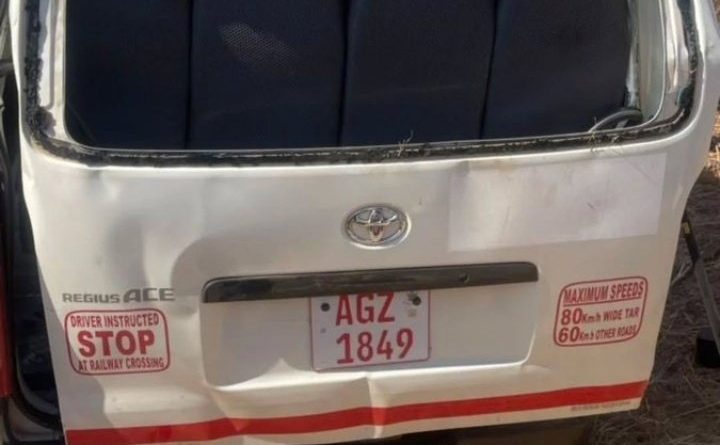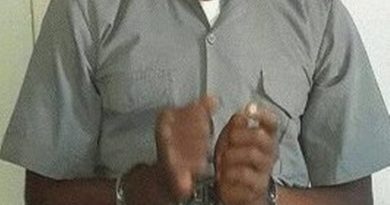Countdown to Kombi phase-out begins in Zimbabwe
“Dealing with mishikashika requires continuous police presence, which we cannot afford. Installing cameras — like those at the corner of Jason Moyo Avenue and Fourth (Simon Muzenda) Street — has proven effective. In countries with 100 percent compliance, it is because of surveillance. Without it, we would need over 50 000 municipal officers.” — City of Harare chief traffic officer Martin Chimombe
> 36-month kombi withdrawal plan proposed
> Over 13 500 commuter omnibuses remain unregistered
THE countdown to the ban on commuter omnibuses (kombis) from the capital’s roads has begun, according to a draft master plan (2025-2045), which proposes to phase out this mode of public transport within three years.
However, commuters remain divided on the potential impact of the move.
“Policy 109 mandates the complete removal of commuter omnibuses from Harare roads within 36 months. Policy 110 institutes an immediate prohibition on all unauthorised pirate taxi operations,” reads part of the master plan.
The city’s new approach will focus on promoting the use of high-capacity vehicles like buses and rail transport.
To achieve this goal, a number of projects, with an estimated cost of US$693,6 million, have been outlined.
These include encouraging investments in high-capacity vehicles like trams and buses, as well as reducing traffic in the city centre by improving junctions, expanding public transport options and limiting the number of cars entering the central business district (CBD).
Smart systems, including intelligent traffic signals, automated enforcement and a light rail corridor, are also being considered to manage traffic flow and improve safety.
Further, the plan focuses on connecting all parts of the city, especially high-density suburbs, to the transport network with better feeder roads, bus stops and pavements.
Some motorists are calling for an immediate ban, citing kombis’ contribution to congestion and road traffic accidents.
However, a snap survey conducted by The Sunday Mail Society revealed that many commuters believe the ban should be tied to sufficient alternative means of transport.
“A ban without sufficient buses would be a recipe for disaster,” notes Taurai Choto from Budiriro.
The Government banned commuter omnibuses during the Covid-19 period but later allowed the vehicles back on the roads after relaxing pandemic regulations.
The sole public transporter then, the Zimbabwe United Passenger Company (Zupco), seemingly struggled to meet demand.
“We do not want kombis due to the reckless behaviour of the crews, but we cannot afford to get stranded either. There needs to be substantial investment in public transport — the purchase of buses — to ensure that we have a solid fleet within the three years.”
Delight Zumani from Chitungwiza shared similar concerns.
“The reality is that few passengers feel safe in kombis. However, does the local authority have a concrete plan in place or are they setting us up for another crisis?”
Conversely, Tendai Gavaza, a motorist, expressed frustration with kombi drivers, describing them as “ungovernable”.
“Kombi drivers think they can rewrite road rules. They run red lights and often drive against traffic. They do not bother who has the right of way. Registered or not, their behaviour is the same — they must be banned.”
Milanda Chiveso thinks female motorists are particularly vulnerable.
“Kombi drivers show no respect for women, hurling obscenities at us like they own the roads,” she said.
“Banning them would be a huge relief. I currently spend at least three hours driving to Glen View after work, because they block lanes and drive against traffic, causing gridlock.”
Unsurprisingly, registered kombi operators believe a ban is not the solution.
“There are over 16 000 kombis in Harare, each employing at least four people directly, with each supporting at least six dependants. That is 384 000 families directly affected,” argued Ngoni Katsvairo, secretary-general of the Greater Harare Association of Commuter Omnibus Operators.
“This figure does not include employees and dependants of downstream industries — mechanics, auto electricians, tyre companies, vendors, fuel and oil suppliers, and rank marshals.”
Katsvairo also warned of the potential impact on the fuel sector.
“A single kombi travels roughly 250 kilometres per day. At 7km per litre, it consumes around 40 litres daily — about US$62 per day or over US$1 600 per month. This represents a substantial volume of business for fuel stations and their employees, which would likely be lost.”
He argues that the authorities need to crack down on illegal kombi operators to ensure compliance.
According to the master plan, Harare currently has 4 087 registered kombis, while the police reports that the city has over 13 500 unregistered commuter omnibuses.
Ban plan explained
City of Harare planner Brian Zvomuya said the proposed ban on kombis is a long-term plan to transition to a more efficient mass public transport system.
The current reliance on kombis, or “para-transport system”, he added, was unsustainable and the primary cause of traffic congestion and accidents.
“We are not saying it is going to happen tomorrow. There will be a transition period of three to four years. We are also saying that we cannot completely depend on a para-transport system,” said Zvomuya.
“Kombis are supposed to support the mainstream public transport system, but that is not what is happening. The opposite is happening; kombis have become the main transport system and buses are supporting them.
“It is not working; there is congestion, traffic accidents . . . Everything is not working well. That is why we are saying let us promote high-capacity vehicles. If we continue working with small-capacity vehicles, we will not succeed as a city or as a country.”
He advised kombi associations to start investing in high-capacity vehicles.
“Gradually, we will have the kombis phased out. This has happened before. Remember, we used to have ETs (emergency taxis). They died a natural death because we started having minibuses/Zupco buses that operated at optimum levels. This is what we are proposing here.”
Previously, the city council tried creating dedicated bus lanes in the capital, but this did not work as expected.
“Such lanes will only be implemented when there are enough buses to support the idea. The dedicated lanes that were there required physical infrastructure, including the right enforcement, which was not there due to a lack of buses,” Zvomuya said.
“When we have a fully functional system, like what used to be the case with Zupco, then all things will be possible.”
Zvomuya also addressed the issue of the long-proposed Harare-Chitungwiza railway.
“This has been on the books as a national project. Anyone living on the land reserved for it and was legally allocated the land would need to be relocated to allow for its construction. This will not be the same case with illegal settlers; they simply have to move without compensation.”
Unfair treatment/stereotyping
Zimbabwe United Deregulated Commuter Operators (ZUDCO) president Frederick Maguramhinga opines that kombis have become a victim of negative stereotypes.
“Registered kombi operators pay all necessary taxes, yet we are unfairly stereotyped due to the council’s failure to eradicate mishikashika (pirate taxis). We urge the council to reconsider its decision, which was made without our input, as it will negatively affect thousands of youths employed in this sector,” said Maguramhinga.
A kombi driver, only identified as Tawanda, also lamented the unfair treatment of registered operators.
“We are told to display route boards and stop touting, but pirate taxis tout freely right next to us. It is unfair that mishikashika can drop passengers anywhere in the CBD. Passengers flock to illegal taxis that drop them exactly where they want, while registered operators are restricted to specific routes and designated ranks.”
But Dexter Ranga, a registered kombi driver, thinks differently.
“We are happy with the pressure that the police have of late been exerting on illegal taxis. For the past week or so, we have been getting passengers at a reasonable rate,” he said.
“We applaud the police and urge them to continue. The situation had become unfair, with most commuters opting for illegal pick-up points. If enforcement continues, everyone will eventually be registered.”
Kombi licensing crisis
Unregistered operators say they are struggling to license their vehicles due to what they describe as prohibitively high fees.
One operator explained that making a kombi fully compliant can cost over US$1 000.
“I think licensing fees need to be reviewed. You need nearly US$1 000 just to complete the paperwork,” said the operator.
“After struggling to buy a kombi, it is difficult to raise that amount. So, we end up playing cat and mouse with the police in a bid to raise the required regulatory fees.”
The current situation, he said, makes it increasingly difficult for registered operators.
“If you are a registered kombi operator and you change your route to avoid congestion, you will be fined. For example, if your permit is for Glen View, you are restricted to Willowvale Road.
“You can be arrested for using Glen Eagles Road instead. Meanwhile, illegal operators move freely. It starts to feel like operating illegally is easier than complying.”
Blitz on pirate taxis
Harare province police spokesperson Inspector Luckmore Chakanza confirmed the ongoing operation targeting illegal pick-up/drop-off points.
“We are conducting awareness campaigns, encouraging passengers to use designated ranks,” said Insp Chakanza.
He also addressed the issue of touting.
“Touting is illegal. No exemptions will be made for registered kombis if their drivers or conductors engage in this practice. We urge all owners of unregistered taxis to regularise their operations and comply with the law.”
Harare City Council spokesperson Stanley Gama acknowledged the municipality’s limited capacity to deal with illegal transport operators.
“We lack the manpower to remove pirate taxis. Registered operators should collaborate with us to eradicate mishikashika and ensure they pay all dues owed to the council.”
The council’s chief traffic officer, Martin Chimombe, weighed in.
“It is unfair to selectively accuse municipal police of corruption without considering the broader context. I recommend increasing fines or adopting electronic systems to prevent evasion,” he said.
“Dealing with mishikashika requires a continuous police presence, which we cannot afford. Installing cameras — like those at the corner of Jason Moyo Avenue and Fourth (Simon Muzenda) Street — has proven effective. In countries with 100 percent compliance, it is because of surveillance. Without it, we would need over 50 000 municipal officers.”
Cost of licensing
The Greater Harare Association of Commuter Operators recently highlighted the financial burden that comes with compliance.
The process includes company registration, operator’s licence and route authority.
According to operators, the cumulative cost of these applications places a heavy strain on kombi owners already grappling with maintenance costs and market competition.
In response to these concerns, President Mnangagwa has directed the immediate implementation of ease-of-doing-business reforms.
The initiative includes a six-month review of levies, licences, fees and permits across 12 key sectors — including transport.
The other sectors under review are health, agriculture, retail, tourism, transport, energy, manufacturing, broadcasting, telecommunications, liquor, construction and financial services.
Many regulators presently require businesses to obtain multiple licences, creating unnecessary complexity and administrative burdens.




